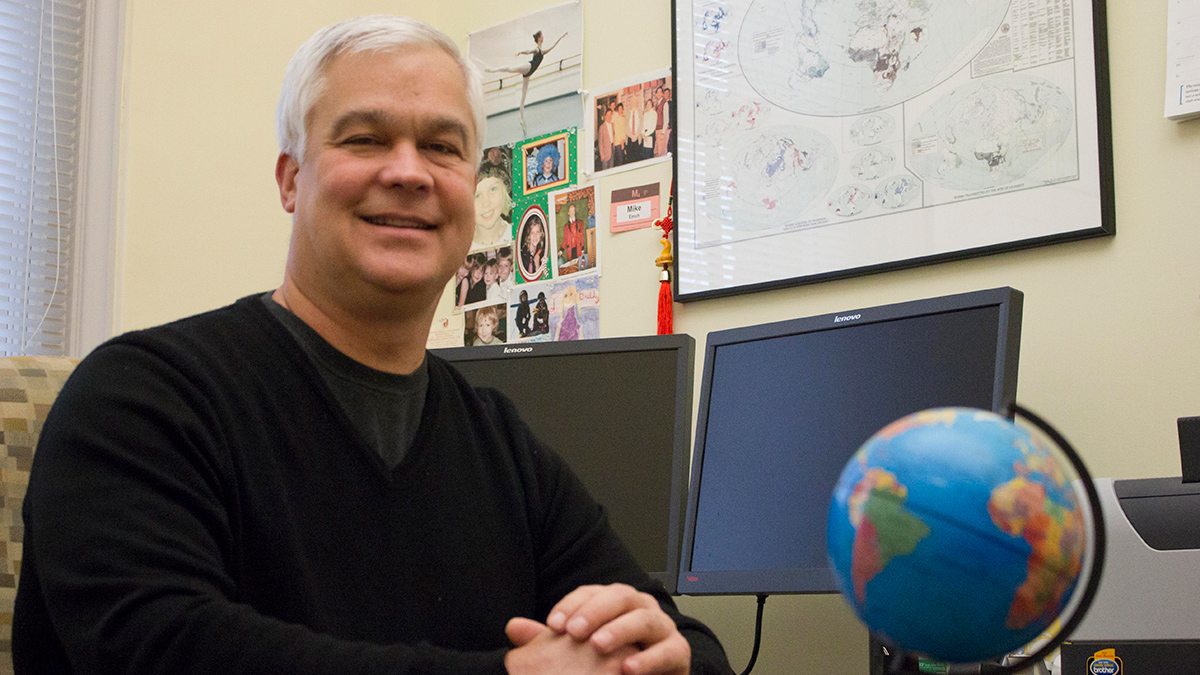The disease ecologist
Michael Emch has spent decades tracking the spread of infectious diseases in human populations around the world. Now he confronts what it means to teach and conduct research during a pandemic.

In late February, as the first reports of COVID-19 cases started to spring up across the country, Michael Emch was beginning a unit on emerging and re-emerging infectious diseases with 50 undergraduate students in his “Health and Medical Geography” class.
“Teaching about infectious diseases in the middle of a pandemic — well, it’s been an interesting learning opportunity,” Emch said. “I don’t think I’ve ever taught classes where more engagement was happening.”
As the W.R. Kenan Jr. Distinguished Professor of Geography and Epidemiology, Emch has spent the past 15 years at UNC-Chapel Hill teaching and conducting research on infectious diseases. He specializes in disease ecology, or how human interaction and environment impact the spread of viruses like COVID-19.
Halfway through the semester, he adjusted the class syllabus to allow his students to focus on the unfolding pandemic: They read the latest reports from Imperial College London, examined projections from the Institute of Health Metrics and Evaluation at the University of Washington and discussed the models published in the daily news.
Every day, in class, over email and, eventually, via Zoom, the students bombarded Emch with questions about how COVID-19 would impact the United States and the world. “They had so many questions — many of them I couldn’t answer,” said Emch, who is also a fellow of the Carolina Population Center. “We’re all living it.”
Solid research infrastructure
For the past fifteen years, Emch has led research projects in sub-Saharan Africa to study diseases like malaria. Now he is applying for grants (and supplements to existing grants) to analyze the spread of COVID-19 across communities in Ghana.
“We want to look at what factors put people most at risk of COVID-19 transmission,” he said. “We think one of those things is a person’s mobility.”
The mobility of a population — how far and how often people need to travel for essential goods or services — may be one of the biggest factors in determining how much a disease will propagate.
His proposal for Ghana will include conducting surveys, taking finger-prick blood samples and testing for COVID-19 antibodies.
“We have a great research infrastructure in Ghana,” Emch said. “We’ll probably understand transmission there better than we understand transmission here.”
But Emch plans to put every effort into tracking the virus closer to home as well. While he waits to hear about funding for the work in Ghana, Emch is pressing ahead with plans to research testing for COVID-19 in central North Carolina. He wants to investigate where testing is available and where people get tested relative to where they live.
Using routine data collected by UNC Health, LabCorp and the North Carolina Department of Health and Human Services, Emch and his students will be able to map the percentage of people in central North Carolina who have been tested by census unit.
“We want to see whether or not there is less testing the further away you get from testing centers,” he said. Emch hypothesizes that rural areas, further away from testing centers, may have less access.
While noting geographic disparities, Emch also wants to look into social disparities. Factors such as race, socioeconomic status and insurance coverage may play a role in who gets tested and who doesn’t.
Much of this work hinges on the creation and management of a massive database — a large task made by possible by Emch’s industrious students. In addition to managing the database, students will be involved in the spatial and statistical analyses of the data, as well as coauthoring papers for peer-reviewed journals and reports.
“All of my students, both graduate and undergraduate, are really interested in contributing to COVID-19 research,” he said. “I think they will all be involved in this effort in some shape or form.”
Incorporating new knowledge and teaching tools
When it comes to teaching during a pandemic, decades of experience and expertise in infectious disease in just one strength. Another essential skill that Emch can offer his students is familiarity with remote communication technologies.
“I’ve been using Zoom for two or three years to connect with my colleagues in Africa,” he said. “I’m already on it several times a month.”
In the fall, Emch will teach a First-Year Seminar on the “Ecology of Infectious Diseases.” Once again, he is making changes to the syllabus, adding a section on COVID-19 to the usual study of malaria and cholera.
“It will be interesting to see how first-year students engage as we’re all still dealing with the impacts of the virus,” he said. “I just hope we’ll be able to be in the same room.”




